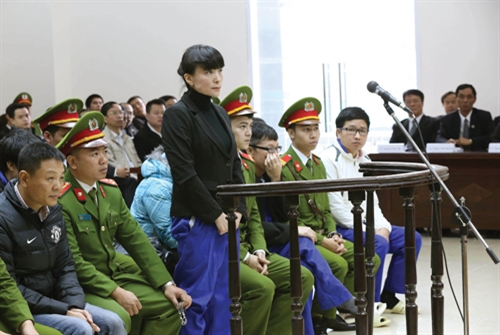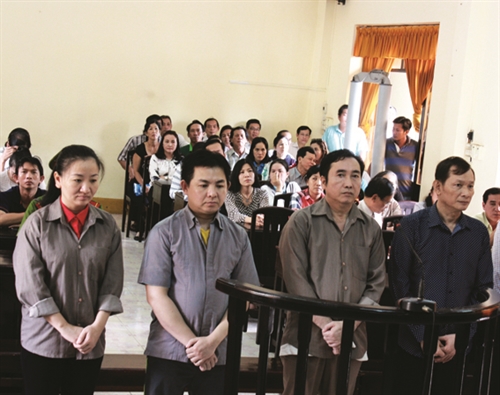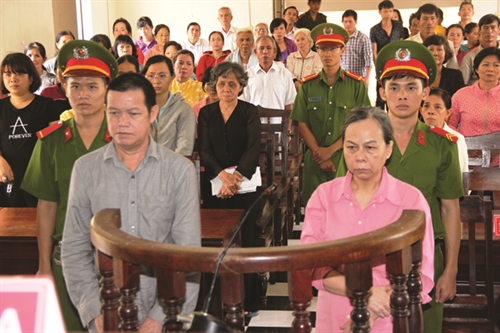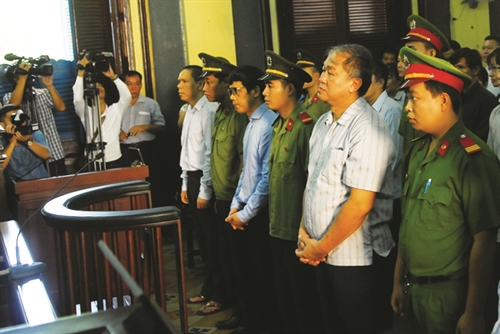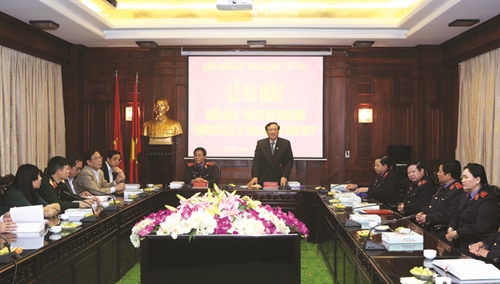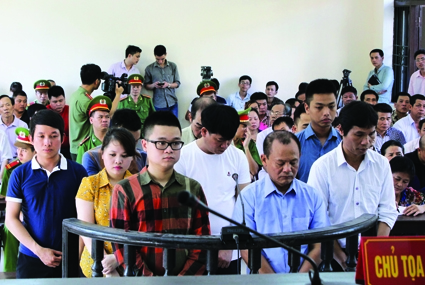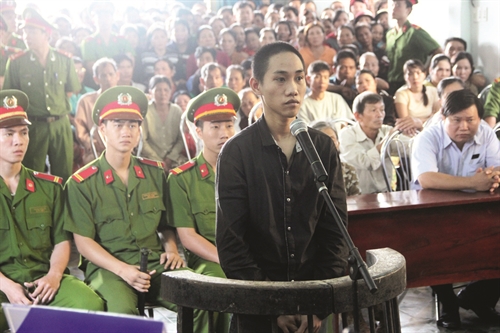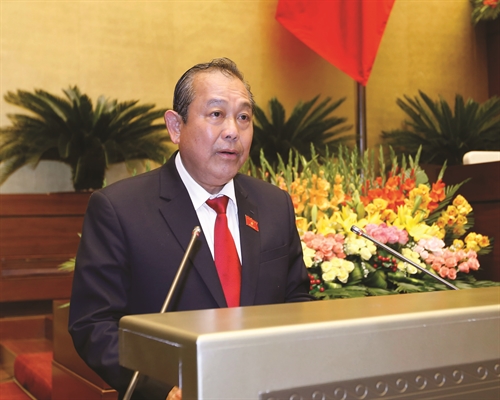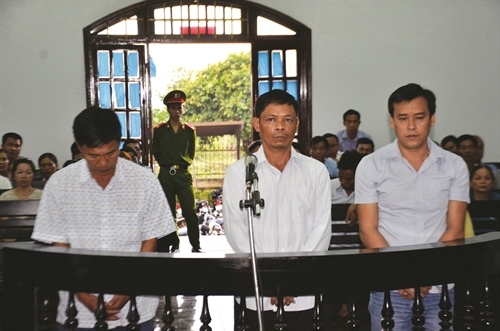Nguyen Thi Phuong Hoa, LL.D
Criminal Law Faculty
Ho Chi Minh City University of Law
In criminal justice, a person under 18 years of age (juvenile) is regarded as having limited capacity to cognize and control his acts and can therefore easily be incited, enticed or forced into committing a crime. By international standards, a juvenile needs special protection. That’s why Article 24.1 of the 1966 International Covenant on Civil and Political Rights (ICCPR) affirms that every child shall have, without any discrimination as to race, color, sex, language, religion, national or social origin, property or birth, the right to such measures of protection as required by his status as a minor, on the part of his family, society and the State.
Vietnam joined the United Nations Convention of the Rights of the Child (UNCRC) on February 28, 1990, and, like other member states of the Convention, it commits to applying every measure, including legislative measure, to secure the rights of the child. Based on the universal standards, the Vietnamese State has institutionalized leniency policies and narrowed the scope of criminal handling of juvenile offenders in the Penal Codes ever enacted in the country, with a view to applying the best handling measures to them.
Criminal handling policy toward juvenile offenders under the 2015 Penal Code (the Code)
Principles of handling
Article 91 of the Code provides principles of handling juvenile offenders as guidelines for the formulation of regulations on penal liability of juveniles and application of criminal law to handling them. These principles have been developed on the basis of the international standards on protection of children and the Vietnamese State’s criminal policy toward juvenile offenders and have some changes compared to those provided in the 1999 Penal Code (the 1999 Code).
These principles can be divided into three groups: i) fundamental guidelines for handling juvenile offenders; ii) principle on application of penalties against juvenile offenders; and iii) principle of diversion.
Fundamental guidelines for handling juvenile offenders
Clause 1, Article 3 of the UNCRC requires: “In all actions concerning children, whether undertaken by public or private social welfare institutions, courts of law, administrative authorities or legislative bodies, the best interests of the child shall be a primary consideration.” The 1990 United Nations Rules for the Protection of Juveniles Deprived of their Liberty also stipulates: “The juvenile justice system should uphold the rights and safety and promote the physical and mental well-being of juveniles. Imprisonment should be used as a last resort.”
In tune with the above juvenile protection guidelines, Clauses 1 and 3, Article 91 of the Code introduce guidelines for handling juvenile offenders with some changes compared to those provided in the 1999 Code:
“1. The handling of persons under 18 years of age committing crimes must best guarantee their interests and aims mainly at educating and helping them redress their mistakes, develop healthily and become citizens useful to the society.
The handling of persons under 18 years of age committing crimes shall be based on their age, their awareness about the danger of their crimes to the society, and the causes and conditions for committing crimes.
2. …
3. Penal liability examination against persons under 18 years of age committing crimes shall only be applied when necessary and based on their personal records, the danger of their criminal acts to the society, and requirements of crime prevention.”
Based on these guidelines, when selecting measures to handle juvenile offenders, competent bodies have to thoroughly consider their interests and make sure that the criminal handling of these offenders aims at educating them and helping them redress their mistakes, develop healthily and become useful to the society.
The capacity of offenders, especially juvenile offenders, to cognize and control their acts differs from case to case. So, these guidelines require competent bodies to decide on handling measures based on the juvenile offenders’ age and awareness about the danger of their crimes to the society, and causes and conditions for crime commission.
The above Clause 3 implies that, when there is a choice between examining and refraining from examining the penal liability of a juvenile offender, criminal proceeding-conducting bodies should choose to examine his penal liability only when it is quite necessary to meet crime prevention requirements, which can be considered by these bodies based on his personal identifications, both negative and positive, and on the judged danger of his criminal acts.
Principle on application of penalties against juvenile offenders
The Code stipulates: “The court shall only apply termed imprisonment to persons under 18 years of age committing crimes if judging that other penalties and educational measures have no deterrent and preventive effect.
When imposing termed imprisonment on persons under 18 years of age committing crimes, the court shall apply penalties lighter than those applied to persons aged full 18 years or older committing similar crimes and for the shortest reasonable term.” (Clause 6, Article 91).
These provisions adhere to the progressive principle that conforms to the guideline in Clause 5, Article 6 of the ICCPR (“Sentence of death shall not be imposed on crimes committed by persons below 18 years of age”) and Article 37(a) of the UNCRC (“Neither capital punishment nor life imprisonment without possibility of release shall be imposed on offenses committed by persons below 18 years of age”).
In addition, the decision on penalties against juvenile offenders must be made in a benevolent manner and aimed at educating and transforming them, as stipulated in Article 37(b) of the UNCRC: “The arrest, detention or imprisonment of a child shall be in conformity with the law and shall be used only as a measure of last resort and for the shortest appropriate period of time.”
Vietnamese criminal law requires competent bodies, when deciding on penalties against juvenile offenders, to consider first of all applying a measure which does not deprive them of their liberty and to impose detention or imprisonment only when other measures have no deterrent and preventive effect.
In sum, when handling juvenile offenders, competent bodies should consider whether to examine their penal liability. Once having decided to examine their penal liability, these bodies should apply first of all measures which do not deprive of their liberty. Finally, they may impose termed imprisonment only when these measures do not work. Once deciding to impose termed imprisonment against a juvenile offender, the court should at the same time choose a specific penalty, taking into account the best interest of this person and determining an appropriate term of imprisonment shorter than that applied to an adult committing the same crime.
Principle of diversion
Diversion is an alternative process of handling criminal acts of juveniles with measures outside the conventional justice system, with greater participation by the community. Diversion may be applied by proceeding-conducting bodies at any time in the proceedings when they deem it necessary. Point d, Clause 3, Article 40 of the UNCRC stipulates: “Whenever appropriate and desirable, measures for dealing with such children without resorting to judicial proceedings, provided that human rights and legal safeguards are fully respected.” Article 11.3 of the 1985 United Nations Standard Minimum Rules for the Administration of Juvenile Justice (Beijing Rules) also stresses: “Any diversion involving referral to appropriate community or other services shall require the consent of the juvenile, or her or his parents or guardian, provided that such decision to refer a case shall be subject to review by a competent authority, upon application.”
Shortcomings in the education and formation of personality of juvenile offenders, which probably constitute a primary cause of their criminal acts, can fully be redressed with the assistance of their families, communities and victims after obtaining their consent. The community-based reconciliation or education of these juveniles should not put any psychological pressure on them, otherwise such measure will not work.
Conforming to the above guideline, Clause 4, Article 91 of the Code says: “During adjudication, the court shall only apply penalties against persons under 18 years of age committing crimes if deeming that the exemption from penal liability and the application of one of the measures prescribed in Section 2 or the application of the measure of education at a reformatory prescribed in Section 3 of this Chapter fail to produce any educational and deterrent effect.”
Section 2, Chapter XII of the Code specifies cases of exemption from penal liability applicable to juvenile offenders. Once exempted from penal liability in these cases, juvenile offenders will be subject to one of educational measures, including reprimand, community-based reconciliation and education at the commune, ward or township, or to the judicial measure of education at a reformatory. In essence, the educational measures encourage the participation of families and the community in the education and reformation of juvenile offenders, helping them mend themselves. Worthy of note, reprimand and community-based reconciliation are provided for the first time in the Code.
Clause 2, Article 91 of the Code specifies cases where juvenile offenders are exempted from penal liability and subject to the educational measures. General conditions for a juvenile offender to be exempted from penal liability include: (i) he commits a crime in a case involving many extenuating circumstances; (ii) he voluntarily redresses most of consequences caused by his criminal act; or (iii) he does not fall into a case of exemption from penal liability and any educational measure specified for all offenders, including offenders having reached full 18 years (Article 29 of the Code). This Clause also enumerates specific cases where juvenile offenders, who belong to different groups of under-18 persons, have committed different crimes or played different roles in the commission of crimes, may be considered for exemption from penal liability and application of educational measures.
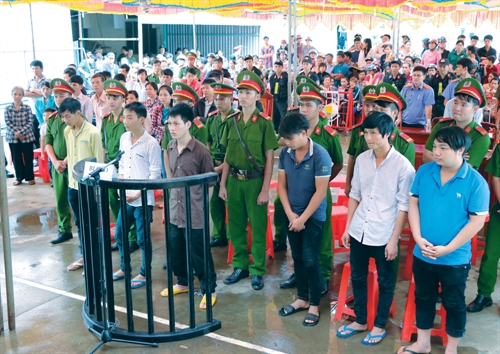 |
| Juvenile defendant Chuong Quan Dau and his accomplices at the hearing in August 2016 for their crimes of plundering property, murder and failure to denounce crimes in Binh Phuoc province__Photo: Dau Tat Thanh/VNA |
Penal liability of persons aged between full 14 years and under 16 years
The 1999 Code requires persons in this age group to bear penal liability for all very serious crimes they intentionally commit or for all particularly serious crimes they intentionally or unintentionally commit.
Article 12 of the Code narrows the scope of criminal handling of persons in this age group. Specifically, they have to bear penal liability for any very serious crimes they intentionally commit and for any particularly serious crimes specified in Clause 2. In addition, they also have to bear penal liability for murder, intentionally inflicting injury or causing harm to the health of other persons, rape, raping a person aged under 16 years, forcible sexual intercourse with a person aged between full 13 years and under 16 years, robbery, or kidnapping in order to appropriate property, regardless of their seriousness. However, lawmakers have recommended revising the provisions on criminal handling of persons in this age group intentionally inflicting injury or causing harm to the health of other persons, rape or kidnapping in order to appropriate property regardless of crime seriousness toward holding them liable only for very serious crimes and particularly serious crimes.
Penalty decision and aggregation
The Code adds new provisions on making decision on penalties against juvenile offenders in case of preparing for a crime or committing an incomplete crime. In Article 102, it adds a separate penalty bracket for those who prepare for a specific crime which is lighter than that prescribed in the 1999 Code. Particularly, the highest penalty applied to persons aged between full 14 years and under 16 years who prepare for a crime must not exceed one-third of the penalty in the penalty range prescribed for the act of preparing for a crime. Similarly, the highest penalty applied to persons aged between full 16 years and under 18 years who prepare for a crime must not exceed half of the penalty in the penalty range prescribed for the act of preparing for a crime.
For those commit an incomplete crime, the Code also narrows the scope of their penal liability. Specifically, the highest penalty applied to persons aged between full 14 years and under 16 years who commit an incomplete crime must not exceed one-third of (the duration of) the penalty of non-custodial reform or termed imprisonment. The highest penalty applied to persons aged between full 16 years and under 18 years who commit an incomplete crime must not exceed half of (the amount or duration of) the penalty of fine, non-custodial reform or termed imprisonment (compared to half and three-quarters, respectively, as prescribed in the 1999 Code).
Regarding the aggregation of penalties in case a juvenile commits several crimes, the Code gives more leniency to the age group of between full 14 years and under 16 years than that of between full 16 years and under 18 years. Specifically, if the aggregate penalty is termed imprisonment, the highest penalty must not exceed 12 years of imprisonment for offenders aged between full 14 years and under 16 years, or 18 years of imprisonment for those aged between full 16 years and under 18 years (Clause 1, Article 103).
In Clauses 2 and 3 of Article 103, the Code prescribes different principles for aggregating penalties applicable to offenders in these age groups in case they commit several crimes, some of which are committed before they reach full 16 or 18 years and some are committed later. However, to be more specific and accurate, Clause 3 should be rewritten as follows:
“3. For a person committing many crimes, some of which are committed after he/she reaches the age of between full 16 years and under 18 years (original phrase: before he/she reaches the age of full 18 years), and some others are committed after he/she is full 18 years, the aggregate penalty is prescribed as follows:
a/ If the penalty pronounced by the court for the crime committed after such person reaches the age of between full 16 years and under 18 years (original phrase: before such person reaches the age of full 18 years) is severer than or equal to the penalty applied to the crime committed when he/she is full 18 years, the aggregate penalty must not exceed the highest penalty prescribed in Clause 1 of this Article;
b/ If the penalty pronounced by the court for the crime committed when such person is full 18 years is severer than the penalty applied to the crime committed after such person reaches the age of between full 16 years and under 18 years (original phrase: before he/she reaches the age of full 18 years), the aggregate penalty shall be applied like for persons aged full 18 years or older.”
Expungement of criminal records
Article 107 of the Code specifies for the first time categories of juvenile convicts who may be considered having no previous criminal records although they are not exempted from penal liability, including: (i) those who are aged between full 14 years and under 16 years; and (ii) those who are aged between full 16 years and under 18 years and convicted for unintentional commission of less serious crimes, serious crimes or very serious crimes.
The duration upon the expiration of which a person who is aged between full 16 years and under 18 years and convicted for intentional commission of a very serious crime or intentional or unintentional commission of a particularly serious crime may have his criminal records automatically expunged is three years (compared to half of his sentence as previously prescribed), provided he does not commit a new crime.-
